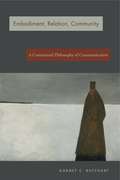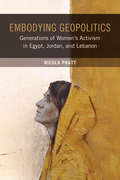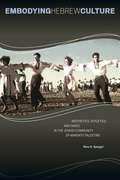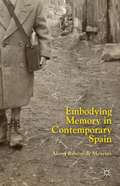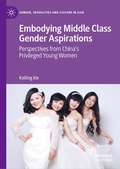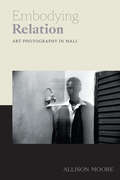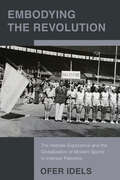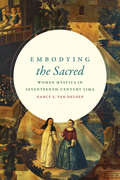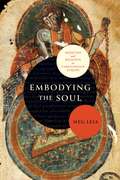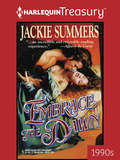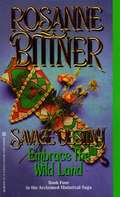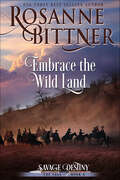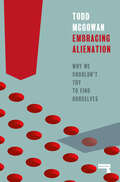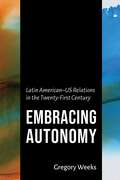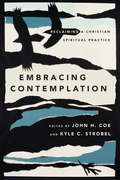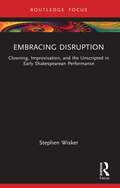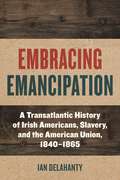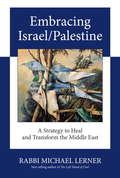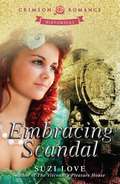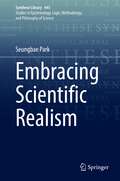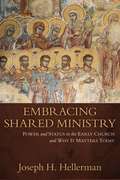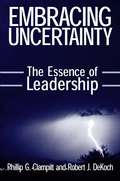- Table View
- List View
Embodiment, Relation, Community: A Continental Philosophy of Communication
by Garnet C. ButchartIn this volume, Garnet C. Butchart shows how human communication can be understood as embodied relations and not merely as a mechanical process of transmission. Expanding on contemporary philosophies of speech and language, self and other, and community and immunity, this book challenges many common assumptions, constructs, and problems of communication theory while offering compelling new resources for future study.Human communication has long been characterized as a problem of transmitting information, or the “outward” sharing of “inner thought” through mediated channels of exchange. Butchart questions that model and the various theories to which it gives rise. Drawing from the work of Giorgio Agamben, Roberto Esposito, Jean-Luc Nancy, and Jacques Lacan—thinkers who, along with Martin Heidegger and Michel Foucault, have critiqued the modern notion of a rational subject—Butchart shows that the subject is shaped by language rather than preformed, and that humans embody, and not just use, the signs and contexts of interaction that form what he calls a “communication community.”Accessibly written and engagingly researched, Embodiment, Relation, Community is relevant for researchers and advanced students of communication, cultural studies, translation, and rhetorical studies, especially those who work with a humanistic or interpretive paradigm.
Embodiment, Relation, Community: A Continental Philosophy of Communication
by Garnet C. ButchartIn this volume, Garnet C. Butchart shows how human communication can be understood as embodied relations and not merely as a mechanical process of transmission. Expanding on contemporary philosophies of speech and language, self and other, and community and immunity, this book challenges many common assumptions, constructs, and problems of communication theory while offering compelling new resources for future study.Human communication has long been characterized as a problem of transmitting information, or the “outward” sharing of “inner thought” through mediated channels of exchange. Butchart questions that model and the various theories to which it gives rise. Drawing from the work of Giorgio Agamben, Roberto Esposito, Jean-Luc Nancy, and Jacques Lacan—thinkers who, along with Martin Heidegger and Michel Foucault, have critiqued the modern notion of a rational subject—Butchart shows that the subject is shaped by language rather than preformed, and that humans embody, and not just use, the signs and contexts of interaction that form what he calls a “communication community.”Accessibly written and engagingly researched, Embodiment, Relation, Community is relevant for researchers and advanced students of communication, cultural studies, translation, and rhetorical studies, especially those who work with a humanistic or interpretive paradigm.
Embodying Geopolitics: Generations of Women’s Activism in Egypt, Jordan, and Lebanon
by Nicola PrattWhen women took to the streets during the mass protests of the Arab Spring, the subject of feminism in the Middle East and North Africa returned to the international spotlight. In the subsequent years, countless commentators treated the region’s gender inequality as a consequence of fundamentally cultural or religious problems. In so doing, they overlooked the specifically political nature of these women’s activism. Moving beyond such culturalist accounts, this book turns to the relations of power in regional and international politics to understand women’s struggles for their rights. Based on over a hundred extensive personal narratives from women of different generations in Egypt, Jordan, and Lebanon, Nicola Pratt traces women’s activism from national independence through to the Arab uprisings, arguing that activist women are critical geopolitical actors. Weaving together these personal accounts with the ongoing legacies of colonialism, Embodying Geopolitics demonstrates how the production and regulation of gender is integrally bound up with the exercise and organization of geopolitical power, with consequences for women’s activism and its effects.
Embodying Hebrew Culture: Aesthetics, Athletics, and Dance in the Jewish Community of Mandate Palestine
by Nina S. SpiegelFrom their conquest of Palestine in 1917 during World War I, until the establishment of the State of Israel in 1948, the British controlled the territory by mandate, representing a distinct cultural period in Middle Eastern history. In Embodying Hebrew Culture: Aesthetics, Athletics, and Dance in the Jewish Community of Mandate Palestine, author Nina S. Spiegel argues that the Jewish community of this era created enduring social, political, religious, and cultural forms through public events, such as festivals, performances, and celebrations. She finds that the physical character of this national public culture represents one of the key innovations of Zionism-embedding the importance of the corporeal into national Jewish life-and remains a significant feature of contemporary Israeli culture. Spiegel analyzes four significant events in this period that have either been unexplored or underexplored: the beauty competitions for Queen Esther in conjunction with the Purim carnivals in Tel Aviv from 1926 to 1929, the first Maccabiah Games or "Jewish Olympics" in Tel Aviv in 1932, the National Dance Competition for theatrical dance in Tel Aviv in 1937, and the Dalia Folk Dance Festivals at Kibbutz Dalia in 1944 and 1947. Drawing on a vast assortment of archives throughout Israel, Spiegel uses an array of untapped primary sources, from written documents to visual and oral materials, including films, photographs, posters, and interviews. Methodologically, Spiegel offers an original approach, integrating the fields of Israel studies, modern Jewish history, cultural history, gender studies, performance studies, dance theory and history, and sports studies. In this detailed, multi-disciplinary volume, Spiegel demonstrates the ways that political and social issues can influence a new society and provides a dynamic framework for interpreting present-day Israeli culture. Students and teachers of Israel studies, performance studies, and Jewish cultural history will appreciate Embodying Hebrew Culture.
Embodying Memory In Contemporary Spain
by Alison Ribeiro de MenezesThis innovative book examines the emergence of a memory discourse in Spain since the millennium, taking as its point of departure recent grave exhumations and the "Law of Historical Memory. " Through an analysis of exhumation photography, novels, films, television, and comics, the volume overturns the notion that Spanish history is pathological.
Embodying Middle Class Gender Aspirations: Perspectives from China’s Privileged Young Women (Gender, Sexualities and Culture in Asia)
by Kailing XieThis book takes a feminist approach to analyse the lives of well-educated urban Chinese women, who were raised to embody the ideals of a modern Chinese nation and are largely the beneficiaries of the policy changes of the post-Mao era. It explores young women’s gendered attitudes to and experiences of marriage, reproductive choices, careers and aspirations for a good life. It sheds light on what keeps mainstream Chinese middle-class women conforming to the current gender regime. It illuminates the contradictory effects of neoliberal techniques deployed by a familial authoritarian regime on these women’s striving for success in urban China, and argues that, paradoxically, women’s individualistic determination to succeed has often led them onto the path of conformity by pursuing exemplary norms which fit into the party-state’s agenda.
Embodying Relation: Art Photography in Mali (Art History Publication Initiative)
by Allison MooreIn Embodying Relation Allison Moore examines the tensions between the local and the global in the art photography movement in Bamako, Mali, which blossomed in the 1990s after Malian photographers Seydou Keïta and Malick Sidibé became internationally famous and the Bamako Photography Biennale was founded. Moore traces the trajectory of Malian photography from the 1880s—when photography first arrived as an apparatus of French colonialism—to the first African studio practitioners of the 1930s and the establishment in 1994 of the Bamako Biennale, Africa's most important continent-wide photographic exhibition. In her detailed discussion of Bamakois artistic aesthetics and institutions, Moore examines the post-fame careers of Keïta and Sidibé, the biennale's structure, the rise of women photographers, cultural preservation through photography, and how Mali's shift to democracy in the early 1990s enabled Bamako's art scene to flourish. Moore shows how Malian photographers' focus on cultural exchange, affective connections with different publics, and merging of traditional cultural precepts with modern notions of art embody Caribbean philosopher and poet Édouard Glissant's notion of “relation” in ways that spark new artistic forms, practices, and communities.
Embodying the Revolution: The Hebrew Experience and the Globalization of Modern Sports in Interwar Palestine
by Ofer IdelsThis original and thought-provoking study offers a fresh perspective on Zionism by exploring Hebrew culture’s ambivalent attitude toward modern sports. Drawing on extensive archival sources and contemporary literary theories, it focuses on Zionism’s surprising anxiety toward sports during the interwar heyday of “muscular Judaism,” revealing an unusual society in which athletes failed to attain national pride and distinction. Addressing themes such as the body, language, space, immigration, internationalism, amateurism, gender, and militarization, Embodying the Revolution presents an innovative reading of Jewish life in Mandate Palestine, linking the marginalization of sports to the meaning and experience of the Zionist Revolution. Idels' compelling interpretation of the appeal of sports, selfhood, and the compromises inherent in radical aspirations—narrated from the periphery of the interwar global rise of sports—challenges contemporary assumptions that dismiss ideology as an elitist myth.
Embodying the Sacred: Women Mystics in Seventeenth-Century Lima
by Nancy E. van DeusenIn seventeenth-century Lima, pious Catholic women gained profound theological understanding and enacted expressions of spiritual devotion by engaging with a wide range of sacred texts and objects, as well as with one another, their families, and ecclesiastical authorities. In Embodying the Sacred, Nancy E. van Deusen considers how women created and navigated a spiritual existence within the colonial city's complex social milieu. Through close readings of diverse primary sources, van Deusen shows that these women recognized the divine—or were objectified as conduits of holiness—in innovative and powerful ways: dressing a religious statue, performing charitable acts, sharing interiorized spiritual visions, constructing autobiographical texts, or offering their hair or fingernails to disciples as living relics. In these manifestations of piety, each of these women transcended the limited outlets available to them for expressing and enacting their faith in colonial Lima, and each transformed early modern Catholicism in meaningful ways.
Embodying the Soul: Medicine and Religion in Carolingian Europe (The Middle Ages Series)
by Meg LejaEmbodying the Soul explores the possibilities and limitations of human intervention in the body's health across the ninth-century Carolingian Empire. Early medieval medicine has long been cast as a superstitious, degraded remnant of a vigorous, rational Greco-Roman tradition. Against such assumptions, Meg Leja argues that Carolingian scholars engaged in an active debate regarding the value of Hippocratic knowledge, a debate framed by the efforts to define Christian orthodoxy that were central to the reforms of Charlemagne and his successors.From a subject with pagan origins that had suspicious links with magic, medical knowledge gradually came to be classified as a sacred art. This development coincided with an intensifying belief that body and soul, the two components of individual identity, cultivated virtue not by waging combat against one another but by working together harmoniously. The book demonstrates that new discussions regarding the legitimacy of medical learning and the merits of good health encouraged a style of self-governance that left an enduring mark on medieval conceptions of individual responsibility. The chapters tackle questions about the soul's material occupation of the body, the spiritual meaning of illness, and the difficulty of diagnosing the ills of the internal bodily cavity.Combating the silence on "dark-age" medicine, Embodying the Soul uncovers new understandings of the physician, the popularity of preventative regimens, and the theological importance attached to dietary regulation and bloodletting. In presenting a cultural history of the body, the book considers a broad range of evidence: theological and pastoral treatises, monastic rules, court poetry, capitularies, hagiographies, biographies, and biblical exegesis. Most important, it offers a dynamic reinterpretation of the large numbers of medical manuscripts that survive from the ninth century but have rarely been the focus of historical study.
Embrace the Dawn
by Jackie SummersThere Was No Escape Fleeing an arranged betrothal, Anne Lowell ran straight into the arms of the infamous highwayman, The Black Fox. Yet was the man who had become her heart's desire a rogue, or a noble thief who fought to restore his King? Though mask and cape hid his identity, Nat Braydon knew nothing could ever hide the pain in his soul. For he had sworn to fight to make up for the sins of his past, even if it cost him a future with his beloved Anne.
Embrace the Wild Land (Savage Destiny, #4)
by Rosanne BittnerEven in the peaceful New Mexico territory, Abbie and Lone Eagle couldn't escape the violence of a country in upheaval as the Civil War raged across the nation. Fate thrust them apart as Lone Eagle was forced to leave Abigail and face the horrors of the white man's war.
Embrace the Wild Land (Savage Destiny: The Saga)
by Rosanne BittnerThe American Civil War plunges Zeke and Abbie Monroe into violence and separation, danger and torn loyalties. Their first-born son, Wolf&’s Blood, takes part in the Sun Dance, a tortuous ritual that initiates him into life with the Cheyenne. Then war forces Zeke to leave his family to join his white brother, Danny, in the conflict. Abbie is left to face a horrible fate at the hands of Zeke&’s worst enemy while he is gone. For the first time in their beloved marriage her strong, brave, warrior husband is not there to protect her. When Zeke returns to learn her fate, the worst violence in his savage soul rages forth to seek sweet revenge. Zeke and Abbie&’s love transcends loss and tragedy thrown at them by savage people in a savage land that can be tamed by only the bravest souls. Embrace the Wild Land is the fourth book in Bittner&’s Savage Destiny series, and one that has been out of print and unavailable for many years. Now you can own it through a download to your eReader!PRAISE:&“Power, passion, tragedy, and triumph are Rosanne Bittner&’s hallmarks. Again and again, she brings readers to tears.&” —Romantic Times&“Extraordinary…Bittner&’s characters spring to life.&” —Publishers Weekly
Embracing Alienation: Why We Shouldnt Try to Find Ourselves
by Todd McgowanThe left views alienation as something to be resisted or overcome, but could it actually form the basis of our emancipation?In Embracing Alienation, Todd McGowan offers a completely different take on alienation, claiming that the effort to overcome it is not a radical response to the current state of things but a failure to see the constitutive power of alienation for all of us. Instead of trying to overcome alienation and accede to an unalienated existence, it argues, we should instead redeem alienation as an existential and political program.Engaging with Shakespeare&’s great tragedies, contemporary films such as Don&’t Worry Darling, and even what occurs on a public bus, as well as thinkers such as Descartes, Hegel, and Marx, McGowan provides a concrete elaboration of how alienation frees people from their situation. Relying on the tradition of dialectical thought and psychoanalytic theory, Embracing Alienation reveals a new way of conceiving how we measure progress — or even if progress should be the aim at all.
Embracing Autonomy: Latin American–US Relations in the Twenty-First Century (The Americas in the World Series)
by Gregory WeeksGregory Weeks's Embracing Autonomy departs from other general treatments of Latin American-US relations not by putting US policy aside but by bringing in the Latin American and global contexts more closely and thus avoiding the incomplete picture provided by a narrow focus solely on the policies of the United States.The core of autonomy for Latin America from the United States is seen in new, deeper, and more numerous relationships that do not include the United States. The book is not a study of rebellion against the United States, or even a critique of US policy. Instead, it is an examination of the major shifts that have taken place in the region in recent decades and how they have shaped Latin American-US relations.Weeks's book provides a clearer understanding of where Latin America stands vis-à-vis the United States in the early twenty-first century. In doing so, we gain a better sense of the trajectory of Latin American-US relations and how they develop in turbulent times.
Embracing Contemplation: Reclaiming a Christian Spiritual Practice
by John H. Coe Kyle C. StrobelWhat does a Christian life lived "by the Spirit" look like? For many Christians throughout history, fulfilling Paul's command in Galatians 5:25 included a form of contemplation and prayer that leads to spiritual formation. But in large part, contemporary Christians—perhaps especially evangelicals—seem to have lost or forgotten about this treasure from their own tradition. Bringing together scholars and practitioners of spiritual formation from across the Protestant spectrum, this volume offers a distinctly evangelical consideration of the benefits of contemplation. The contributors draw on historical examples from the church—including John Calvin, Richard Baxter, Jonathan Edwards, and John Wesley—to consider how contemplative prayer can shape Christian living today. The result is a robust guide to embracing contemplation that will help Christians as they seek to keep in step with the Spirit.
Embracing Defeat: Japan in the Wake of World War II
by John W. DowerDrawing on a vast range of Japanese sources and illustrated with dozens of astonishing documentary photographs, Embracing Defeat is the fullest and most important history of the more than six years of American occupation, which affected every level of Japanese society, often in ways neither side could anticipate. Dower, whom Stephen E. Ambrose has called "America's foremost historian of the Second World War in the Pacific," gives us the rich and turbulent interplay between West and East, the victor and the vanquished, in a way never before attempted, from top-level manipulations concerning the fate of Emperor Hirohito to the hopes and fears of men and women in every walk of life. Already regarded as the benchmark in its field, Embracing Defeat is a work of colossal scholarship and history of the very first order. John W. Dower is the Elting E. Morison Professor of History at the Massachusetts Institute of Technology. He is a winner of the National Book Critics Circle Award for War Without Mercy.<P><P> Winner of the National Book Award.<P> Pulitzer Prize Winner
Embracing Disruption: Clowning, Improvisation, and the Unscripted in Early Shakespearean Performance (Routledge Advances in Theatre & Performance Studies)
by Stephen WiskerThis volume celebrates the centrality of clowning in Shakespeare’s conception of theatre and explores how he purposefully invited the clown’s anarchic energy into the heart of his dramaturgy.Clowning was a potent but divisive force in the theater of Shakespeare’s time, challenging the emerging tyranny of decorum and the developing notion of the authorial voice. As such, the figure of the clown is key to understanding the pervasive tension between existing and emergent forms of Elizabethan theater, and unlocks forgotten levels of meaning in Shakespeare’s plays, meanings that were only fully experienced in performance rather than on the page. The great clown Dick Tarleton dominated the London theater of the 1580’s and deeply informed Shakespeare’s understanding of the anarchic power of performance. By the 1590’s, however, the clown’s voice was increasingly silenced by emerging theater practice intent on authorial control and Elizabethan codes of decorum. Against the dominant critical tide, Shakespeare continued to embrace clowning and worked closely with Will Kemp—Tarleton’s successor as the greatest clown of his age—specifically and deliberately placing him alongside his leading man, Richard Burbage, the originator of the roles of Romeo, Hal, Hamlet and many others. Through an analysis of key scenes in Romeo and Juliet and Henry IV, Embracing Disruption illustrates the enormously generative, unstable, and compelling relationship between these two actors, Burbage and Kemp—the hero and the clown—and how their extraordinary dynamic was experienced on the stage rather than on the page. This hero-clown dynamic continues even after Kemp’s departure from Shakespeare’s company: Hamlet features the ghosts of Tarleton and Kemp, two clowns deeply informing Burbage’s performance as the hero. Then a similar dynamic emerges between Kemp’s replacement, a very different clown in Robert Armin playing the Fool opposite Burbage in King Lear. In each instance, the presence of the clown crucially informs the audience’s understanding of the hero. Moreover, Shakespeare’s increasingly sophisticated deployment of clowning comments on and resists the transformation and gentrification of the theater that defined the Elizabethan era.This study will be of great interest to students and scholars in Performance studies and Shakespeare studies.
Embracing Emancipation: A Transatlantic History of Irish Americans, Slavery, and the American Union, 1840-1865 (Reconstructing America)
by Ian DelahantyWINNER, 2024 LAWRENCE J. McCAFFREY PRIZE FOR BEST BOOK ON IRISH AMERICAChallenges conventional narratives of the Civil War era that emphasize Irish Americans’ unceasing opposition to Black freedomEmbracing Emancipation tackles a perennial question in scholarship on the Civil War era: Why did Irish Americans, who claimed to have been oppressed in Ireland, so vehemently opposed the antislavery movement in the United States? Challenging conventional answers to this question that focus on the cultural, political, and economic circumstances of the Irish in America, Embracing Emancipation locates the origins of Irish American opposition to antislavery in famine-era Ireland. There, a distinctively Irish critique of abolitionism emerged during the 1840s, one that was adopted and adapted by Irish Americans during the sectional crisis. The Irish critique of abolitionism meshed with Irish Americans’ belief that the American Union would uplift Irish people on both sides of the Atlantic—if only it could be saved from the forces of disunion.Whereas conventional accounts of the Civil War itself emphasize Irish immigrants’ involvement in the New York City draft riots as a brutal coda to their unflinching opposition to emancipation, Delahanty uncovers a history of Irish Americans who embraced emancipation. Irish American soldiers realized that aiding Black southerners’ attempts at self-liberation would help to subdue the Confederate rebellion. Wartime developments in the United States and Ireland affirmed Irish American Unionists’ belief that the perpetuity of their adopted country was vital to the economic and political prospects of current and future immigrants and to their hopes for Ireland’s independence. Even as some Irish immigrants evinced their disdain for emancipation by lashing out against Union authorities and African Americans in northern cities, many others argued that their transatlantic interests in restoring the Union now aligned with slavery’s demise. While myriad Irish Americans ultimately abandoned their hostility to antislavery, their backgrounds in and continuously renewed connections with Ireland remained consistent influences on how the Irish in America took part in debate over the future of American slavery.
Embracing His Past: An Uplifting Inspirational Romance
by Christina MillerHe came to find his son… but might discover love along the way. Stunned to learn he has an adult son, widower Harrison Mitchell&’s eager to track him down and build a relationship. But when he uproots his life and moves to Natchez, Mississippi, he&’s hit with another surprise: his new boss, Anise Armstrong, is his son&’s adoptive mother. Now he must win her trust to prove he deserves to be a father and grandfather…and possibly a husband.From Love Inspired: Uplifting stories of faith, forgiveness and hope.
Embracing Israel/Palestine: A Strategy to Heal and Transform the Middle East
by Michael LernerA major modern conundrum is how the Arab/Israel conflict remains unresolved and, seemingly, unresolvable. In this inspirational book, Rabbi Michael Lerner suggests that a change in consciousness is crucial. With clarity and honesty, he examines how the mutual demonization and discounting of each sides' legitimate needs drive the debate, and he points to new ways of thinking that can lead to a solution. Lerner emphasizes that this new approach to the issue requires giving primacy to love, kindness, and generosity. It calls for challenging the master narratives in both Israel and Palestine as well as the false idea that "homeland security" can be achieved through military, political, economic, or media domination. Lerner makes the case that a lasting peace must prioritize helping people on all sides (including Europe and the U.S.) and that real security is best achieved through an ethos of caring and generosity toward "the other." As many spiritual leaders have taught, problems like these cannot be solved at the same level at which they originated--one must seek higher ground, and that becomes a central task for anyone who wants a sustainable peace. Embracing Israel/Palestine is written for those looking for positive, practical solutions to this ongoing dilemma.(From the Trade Paperback edition.)
Embracing Scandal
by Suzi LoveAfter Lady Rebecca Jamison, a mathematical genius, saves her family from financial ruin by secretly investing in railway stocks on the London stock exchange, a greedy syndicate, desperate for Becca's calculations and predictions, murders her friend and threatens the Jamison family, forcing Becca to beg assistance from her childhood friend, Cayle St. Martin.The newly titled Duke of Sherwyn has returned to London after five years on the continent extending his family's shipping interests. He's shunned his privileged London life and his father's unbending attitudes, and becomes committed to employing the spying tactics he learned on the continent to help Becca indict the syndicate - and using his skills as a lover to seduce her into his bed.But how will Cayle be able to convince Becca, a determinedly self-sufficient spinster, that he can be more to her than just a protector?Sensuality Level: Sensual
Embracing Scientific Realism (Synthese Library #445)
by Seungbae ParkThis book provides philosophers of science with new theoretical resources for making their own contributions to the scientific realism debate. Readers will encounter old and new arguments for and against scientific realism. They will also be given useful tips for how to provide influential formulations of scientific realism and antirealism. Finally, they will see how scientific realism relates to scientific progress, scientific understanding, mathematical realism, and scientific practice.
Embracing Shared Ministry: Power and Status in the Early Church and Why It Matters Today
by Joseph H. HellermanHealthy church leadership based on the model of shared ministry in the early churchSocial historian and pastor Joe Hellerman addresses issues of power and authority in the church--in the New Testament and in the church today--in a fresh, culturally nuanced way. The local church, Hellerman maintains, should be led and taught by a community of leaders who relate to one another first as brothers and sisters in Christ, and who function only secondarily--and only within the parameters of that primary relational context-- as vision-casting, decision-making leaders for the broader church family. Unique among contemporary treatments of servant leadership, Hellerman interprets the biblical materials against the background of ancient Roman cultural values, in order to demonstrate a social context for ministry that will provide healthy checks and balances on the use of pastoral power and authority in our congregations. Joseph Hellerman is one of those unique individuals who is equally a scholar and a practitioner.
Embracing Uncertainty: The Essence of Leadership
by Robert J. DeKoch Phillip G ClampittThis guide offers a different approach from the misleading formulae for success offered by much self-help business literature. The authors believe that in today's turbulent competitive environment, it is necessary to embrace uncertainty and set more realistic expectations.
